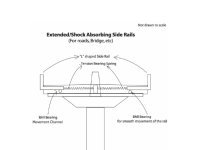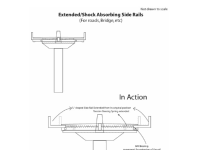The proposed design will prevent and reduce injuries and destruction in road accidents in specific locations and settings. It will also help in improving public safety and security in road accidents. It may also lead to other product development if ICT and advanced materials are incorporated.
The generally erected road rails are not responsive to the depth of impact from accidents and as they are static total force exerted on any such rail increases the probability of failure of the rail in relation to the weight and speed of the vehicle. As such the total force if crosses the load bearing capacity of the rails the rail will shatter or the vehicle itself may topple over the rail.
The idea will increase the load bearing capacity of side rails through giving rooms for extension of the rail with a platform that will help in minimizing the total force (mass*velocity/momentum) exerted on a given rail. Before reaching the threshold limit of the rail’s capacity it will extend through its channel anchored with the extension spring spreading the total force/load along the spring which is ultimately tagged into an inlet in the road divider. The rail from additional support of the road divider in the middle and the whole road surface of the lane on which the accident is happening will be able to bear more load than generally it would have.
This idea can be implemented any where on earth where the road topology and structure is risky by natural or landscape setting, turning points, flyovers, bridge, culverts etc. Even this design concept can be implemented along the elevated railway tracks.
The required load bearing capacity of the side-rails and distributable force over the springs has to be calculated from historical speed and weight data of vehicles of the area in question. Mathematical modeling is possible using basic laws of physics and mathematics to estimate the probable moment ranges (up to maximum threshold) on the side rail and the required elasticity and tension capacity of the extension springs, room for extension of side rail and width of side rail platform.
The extension spring will be attached on one end with the platform for the side rail and the other end with the road divider in the middle of the road (in case of double lane) or with the opposite side of the road in case of single lane (no mid divider). The base level of the road platform will be designed with “U” shaped channels for the ball bearings and placement of the extension springs. This can be done on continuous form or block form of required length and width depending on the road structure and available space.
Existing materials can be used in this idea. The production cost may increase by 15 to 20% in general from the existing practice if incorporated during the design phase. For renovating the existing road structures it will cost the road bed removal and materials waste cost as additional.
Like this entry?
-
About the Entrant
- Name:Reza Khan
- Type of entry:individual
- Software used for this entry:Illustrator
- Patent status:none








